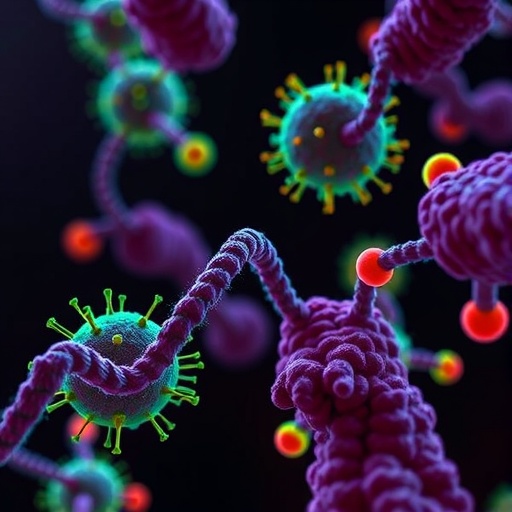In a groundbreaking study that ushers in a new era of immunotherapy, researchers have adeptly harnessed the capabilities of mesenchymal stem cells (MSCs) through innovative mRNA engineering. This endeavor has led to the inception of a promising allogeneic cell therapy termed DC-25, showcasing its potential to transcend the limitations associated with conventional autologous therapies. Autologous therapies, while effective in certain scenarios, often possess constraints such as the need for patient-specific cells and the extended time required for manufacturing individualized treatments. DC-25, on the other hand, offers a robust off-the-shelf solution, poised to revolutionize patient care.
At the heart of this exciting development lies the strategic manipulation of mRNA to orchestrate the expression of three essential therapeutic components within MSCs. The first of these components is CXCR4, a chemokine receptor that serves as a navigational guide for MSCs. This engineered construct enables the targeted migration of the MSCs to sites of interest, enhancing their therapeutic utility. By directing these cells to areas where they are most needed, researchers can optimize treatment efficacy and mitigate potential off-target effects.
The second key component integrated into DC-25 is a T cell engager specifically designed to bind to B cell maturation antigen (BCMA). BCMA is a critical player in the pathology of various cancers and autoimmune disorders, particularly in the context of plasma cells. By equipping MSCs with the ability to engage T cells against BCMA-expressing cells, DC-25 systematically targets and eliminates these harmful plasma cells, delivering a dual attack on malignant and autoreactive populations. This T cell engagement underscores the power of precision medicine, maximizing therapeutic impact while minimizing collateral damage.
Additionally, DC-25 is armed with interleukin-12 (IL-12), a potent cytokine known for its ability to stimulate pro-inflammatory responses within the immune system. The incorporation of IL-12 not only amplifies the immune response but also helps to create a favorable microenvironment for the therapeutic activities of the MSCs. This dynamic interplay between the various components of DC-25 exemplifies a novel approach to immunotherapy that aims to harness the innate capabilities of the immune system while directing them toward specific therapeutic goals.
In preclinical studies, DC-25 has demonstrated remarkable efficacy, particularly in a myeloma model. The results were striking—DC-25 exhibited a greater potency in targeting and eradicating myeloma cells compared to traditional T cell engager protein infusions. The synergistic effects of the engineered MSCs provided an elevated therapeutic ceiling, showcasing the immense potential of this engineered cell therapy in combating aggressive hematological malignancies.
As the research progressed, the safety of DC-25 was brought under scrutiny in a phase 1 clinical study involving patients with myeloma. Early findings suggested that DC-25 not only held promise in terms of efficacy but also appeared to be safe for patient administration. Notably, the therapy elicited significant production of IL-12 following each infusion, reaffirming its intended immunotherapeutic effects. These findings set a positive precedent and pave the way for future trials aimed at further elucidating the clinical utility of DC-25.
The implications of this pioneering research stretch far beyond myeloma alone. The versatility of mRNA engineering presents exciting opportunities to develop a range of allogeneic cell therapies that can address a spectrum of diseases. By exploiting the malleability of mRNA constructs, researchers can tailor therapies to engage diverse immune pathways, creating a landscape where personalized medicine can be achieved on a broader scale.
However, the path ahead is not without challenges. One of the prominent issues in the field of cell therapy revolves around the potential for immune rejection of allogeneic cells. While MSCs have been noted for their immunomodulatory properties, ensuring their persistence and function within a recipient’s immune system remains a critical focus of ongoing research. Addressing these concerns will be paramount to the successful translation of these innovative therapies from preclinical models to real-world clinical applications.
Moreover, as the field of mRNA therapeutics continues to evolve, the increasing availability of mRNA technology will likely catalyze a wave of breakthroughs not only in oncology but also in autoimmune diseases, infectious diseases, and beyond. The ingenuity showcased in the development of DC-25 serves as a testament to the power of interdisciplinary research and collaboration, merging insights from molecular biology, immunology, and engineering.
As additional studies unfold, there is a vibrant enthusiasm within the scientific community about the potential of mRNA-based allogeneic therapies such as DC-25. The carefully orchestrated design of these therapies aims not only to curb cancer but also to enhance the overall immune response to a range of diseases. Future research is poised to unveil more sophisticated iterations of engineered cell therapies that could ultimately redefine conventional treatment paradigms.
In conclusion, the introduction of DC-25, a novel mRNA-engineered allogeneic therapy, marks a significant turning point in the realm of cell-based immunotherapy. Its ability to engender targeted immune responses while maintaining safety and efficacy sets the stage for a new chapter in therapeutic options for patients facing challenging malignancies. As the scientific community rallies around these advancements, the horizon for mRNA-based cell therapies looks bright, promising hope for both clinicians and patients alike in the relentless battle against disease.
Subject of Research: Allogeneic cell therapy using mRNA-engineered mesenchymal stem cells.
Article Title: mRNA engineering of allogeneic mesenchymal stem cells enables coordinated delivery of T cell engagers and immunotherapeutic cues.
Article References:
Stewart, C.A., Daniel, S., Curvino, E.J. et al. mRNA engineering of allogeneic mesenchymal stem cells enables coordinated delivery of T cell engagers and immunotherapeutic cues.
Nat. Biomed. Eng (2025). https://doi.org/10.1038/s41551-025-01552-z
Image Credits: AI Generated
DOI: https://doi.org/10.1038/s41551-025-01552-z
Keywords: Allogeneic cell therapy, mesenchymal stem cells, mRNA engineering, immunotherapy, T cell engager, interleukin-12, cancer treatment, myeloma.
Tags: allogeneic stem cell immunotherapyCXCR4 receptor in stem cell navigationDC-25 cell therapy developmentenhancing therapeutic efficacy with mRNAimmunotherapy advancements through stem cell manipulationinnovative approaches in cancer immunotherapymesenchymal stem cells in cancer treatmentmRNA engineering in stem cell therapyoff-the-shelf cell therapiesovercoming autologous therapy limitationsT cell engager for BCMA targetingtargeted migration of mesenchymal stem cells





